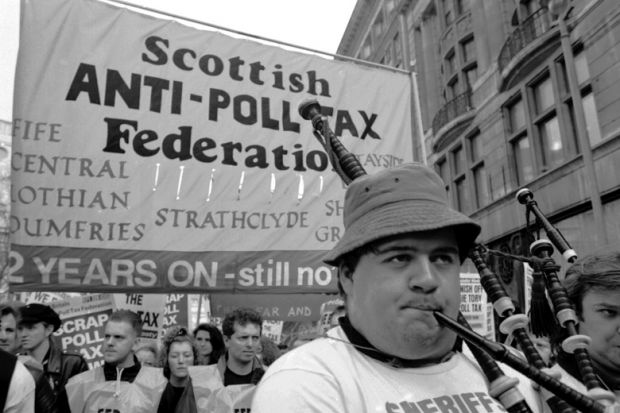Tom Devine is unquestionably Scotland’s most famous historian; indeed, sales of his 1999 book The Scottish Nation were said to have outstripped those of a Harry Potter title for a time. In summer of 2014, unlike J. K. Rowling, Devine declared for independence. Like so many of his countrymen from historically Labour-supporting communities, his sympathies had shifted. Perhaps Devine’s personal journey personifies that of his nation. Long acclaimed in Scotland, he would become a major figure in British academia as well. He was (and remains) a fellow of the British Academy, was awarded a Royal Medal by the Royal Society of Edinburgh on behalf of the Queen in 2001, and was knighted in 2014. Thus his conversion to the independence cause really was news.
“Forever be United into One Kingdom”, the first clause of the 1707 Act of Union says of England and Scotland. In 2014, it seemed that “forever” might be about to end. Amid the excitement of the referendum campaign, Devine held up the true historian’s warning – “the future is not my period” – and I recall laughing approvingly when I heard him on the radio speaking those words. In Independence or Union, Devine continues to resist prophecy. In fact, the book climaxes with a thoroughly reasoned assessment of where the Scottish National Party finds itself, and how and why Labour was eviscerated in the 2015 general election. It assesses the “vow” that David Cameron made to devolve more powers. Scots had expected “devo max”, but they were granted less. Staying excessive confidence, Devine notes the risks facing the SNP. Only once does he allow himself a speculation: on how a quick second referendum might reveal 2014 to have been a high-water mark. His comparator is Quebec, where support for independence has shrunk since the 1990s.
Preceding those reflections on the present, the main body of the book offers a crisp and well-paced account of the Union from 1707. Addressing a general readership, Devine describes with elan the historically federal relationship between the two countries as a marriage of convenience, not of love. He frames the past 300 years as a series of connections that nevertheless allowed the retention of powers and national cultures, so that ending the Union might be easier than Unionists hope. In charting previous nationalist challenges, he emphasises their contrasts with the energy and depth of today’s movement for political independence.
Devine also describes what held the Union together, and how so many of those elements have dissolved. Where once the Scots enjoyed the fruits of British imperial power, in the post-war period political federalism appeared to offer fewer advantages. Industries crumbled, the poll tax was foolishly tried out north of the border, and Scots watched oil and gas wealth frittered away on welfare costs that they viewed as a consequence of London policies. As this went on, England and Scotland looked less unified in heart, mind and deed. Scots remained resolutely social democratic and left of centre, and Margaret Thatcher’s and Tony Blair’s England did not.
Scrutinising the glues and the solvents of the Union, Devine shows how waning monarchism, the loss of empire, the disappearance of an external Soviet threat and the decline of a unifying industrial, class-based and British common culture shook the connection. He considers the success of the SNP in devolved government as a key challenge to Union. The debate has not gone away since Scotland came so close to separation two years ago, and this is a very timely contribution.
Donald M. MacRaild is professor of British and Irish history, Ulster University. He is co-author, with Tanja Bueltmann, of The English Diaspora in North America: Migration, Ethnicity and Association, 1730s-1950s (in press).
Independence or Union: Scotland’s Past and Scotland’s Present
By T. M. Devine
Allen Lane, 320pp, £20.00
ISBN 9780241215876
Published 3 March 2016
后记
Print headline: Irreconcilable differences?




